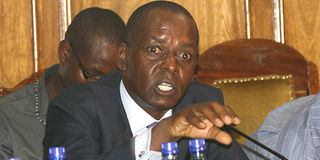Bid to clip powers of the Treasury

File | NATION
Transport minister Amos Kimunya, who is a former Finance minister
What you need to know:
- House committee seeks to grant CBK autonomy in handling monetary matters without undue influence from ministry
A parliamentary committee wants the powers of Finance minister clipped to give the Central Bank of Kenya autonomy on monetary matters.
This comes in the light of revelations by the Public Accounts Committee that former Finance minister Amos Kimunya ordered CBK governor Njuguna Ndung’u to cancel currency printing contracts — leading to loss of public funds.
In the report tabled in Parliament by Ikolomani MP Boni Khalwale, the minister is accused of directing CBK to cancel the contract with UK security printer De La Rue for printing 1.71 billion pieces of banknotes, leading to the loss of Sh1.8 billion public funds.
According to the report, Mr Kimunya made the order even when his ministry was not part of the contract.
The committee argued that since the enactment of the Procurement and Disposal Act in 2005, the Treasury had no business directing or instructing CBK on procurement issues.
Prof Ndung’u was not spared either. He was faulted by the committee for taking the orders from the Finance minister to cancel the contract.
The MPs said the orders compromised the bank’s position and taxpayers’ interests were not protected.
The committee has recommended that the Treasury fast-tracks the tabling in Parliament of a Bill guaranteeing CBK the necessary independence to enable it to undertake its operations effectively.
According to the report, the committee appeared amazed that Mr Kimunya, now the Transport minister, admitted to playing a role in ensuring that the contract of printing new generation banknotes stalled and, therefore, overtaken by events.
This was done when he declined to authorise the signing of the banknote designs by acting CBK governor Jacinta Mwatela, in the absence of the substantive governor to enable De La Rue print the banknotes.
According to evidence by Mrs Mwatela and former secretary of CBK board of directors John Macharia Gikonyo, after the contract had been signed, its implementation stalled.
This was because De La Rue was waiting for instructions from Mr Kimunya on whose signatures were to appear.
Normally the signatures of the governor and Finance permanent secretary appear on the banknotes.
“At that time, the substantive governor of Central Bank of Kenya, Dr Andrew Mulei, had stepped aside in accordance with the law as he was facing prosecution in a court of law and his deputy, Mrs Mwatela, was the acting governor,” reads the report.
Section 13(3) of the Central Bank of Kenya Act Cap 491 states: “ The deputy governor shall act for the governor and shall exercise all the powers, perform all of the functions conferred on the governor under this Act whenever the governor is temporarily absent, and shall perform such other functions as the governor may from time to time assign to him”.
Reads the report: “Notwithstanding this provision and the overriding consequences, Mr Kimunya declined to authorise the signing of the designs by Mrs Mwatela the acting governor.”
Mr Kimunya told the parliamentary committee that he could not authorise since it did not look good and further that Dr Mulei still had a valid contract with CBK.




